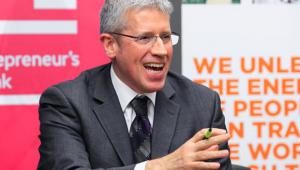There’s been an unprecedented level of fluctuation in the political landscape since the EU referendum. With the country facing an uncertain financial future, it’s imperative that the Department for Work and Pension’s new Work and Health Programme is effective for those jobseekers with health conditions and disabilities that it’s meant to support.
Public services are undergoing a system-wide reform with increasing demand pitched against a backdrop of reduced government funding. We need new ideas and different ways of delivering services that meet the needs of the most vulnerable people in the UK.
At the House of Lords last Thursday, Big Society Capital held a roundtable to launch a new piece of research we commissioned from the think-tank Reform, which recommends ways we can ensure more effective delivery through improved public procurement.
The roundtable raised some interesting and pertinent questions around the longer-term implications of the programme, and the work and health agenda more broadly. There was a general sense that we had an opportunity here, as the DWP is encouragingly in listening mode. So the challenge is about how we work together and harness the expertise of the social sector with that of DWP to achieve the best outcome.
On that note, participants commented that the size of the programme, growing to £130m a year by 2020, was not sufficient to address the size of the social issues in the UK. Also, with the UK’s exit from Europe, additional money from the EU that DWP was hoping for is unlikely to materialise.
There were questions about what happens next if the programme is successful and gets people with disabilities into work. It’s not just about getting people into work, but about job progression as well, with concerns around zero hour contracts and in-work poverty.
There was also a discussion on the broader labour market, and the role of employers in taking on people with disabilities and mental health conditions, which the government is attempting to tackle through initiatives like Disability Confident, but would likely require a more joined-up effort and support to move the needle.
So, what does all this mean for the new Work and Health Programme?
We need bold decisions from commissioners and procurement teams. But that requires behavioural change from civil servants to actively seek new ideas and be incentivised for doing so, if they achieve better outcomes. It’s a longer-term question of market stewardship, which Reform highlighted as one of their recommendations in the report.
Ultimately, with the procurement for the Work and Health Programme gaining pace, we need to work pragmatically to ensure we get the best outcomes for vulnerable people with the money we have. It’s about ensuring robust competition with a diversity of providers delivering the programme.
We believe, alongside 12 other organisations who signed our open letter to government, that the best way for DWP to do that, informed by Reform’s research, are as follows:
- Guarantee minimum-referral volumes. This will allow a broader range of providers to bid with confidence that the scope is realistic and sustainable.
- Set lower thresholds for parent-company guarantees at no more than 10% of annual contract value. This would reduce barriers to market entry and allow smaller and specialist organisations to bid.
- Place a heavier emphasis on quality of bids. This would help prevent a race to the bottom on cost, where only providers who discount price without improving quality are able to secure contracts.
As we move ever closer to devolution, there has never been a more important time for government and local commissioners to ensure there is a level playing field and better quality in the commissioning and procurement of public services.




















